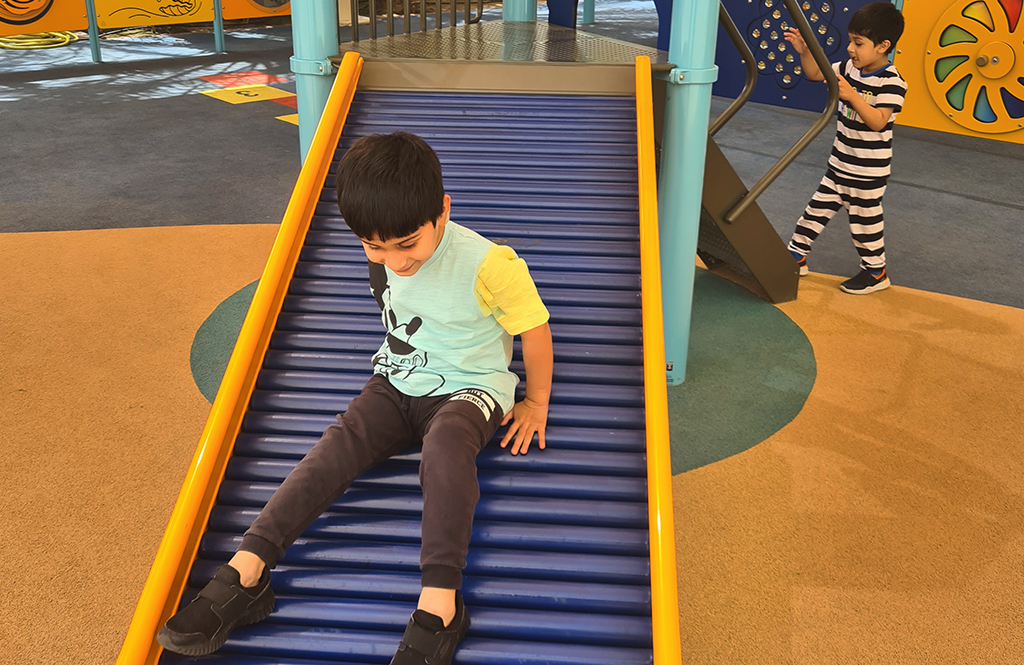
5 answers from the expert
On the occasion of Autism Awareness Month, we invite Dr Georgia Pavlopoulou to share with us in this blog post about her work with siblings and families of children with a diagnosis of autism.
Dr Georgia Pavlopoulou is an internationally awarded researcher, Trustee at Sibs Charity, and lecturer for University College London and Anna Freud National Centre for Families in the United Kingdom. Dr Pavlopoulou trains healthcare practitioners and teachers in autism and family mental health, and she leads the Group for Research in Relationships in Neurodiversity. Further information on Dr Pavlopoulou’s expertise is provided on this link https://iris.ucl.ac.uk/iris/browse/profile?upi=GPAVL96
What are the common experiences for families receiving a diagnosis of autism?
“Parents often go through a period of uncertainty before diagnosis. During the diagnostic process, parents might experience relief by getting an accurate picture of their child’s strengths and difficulties. On the other hand, for some families, receiving a diagnosis is a painful process because of the societal stigma attached to it. Also, parents worry about the future and what it means for a person to be autistic. Parents often need a timely and a sensitive approach that outlines the strengths and struggles of the person with the autistic condition, and at the same time they need reassurance that their autistic and non-autistic children can lead happy and healthy lives.
Every autistic person will develop in different ways. But all autistic people need structure, support, and our empathy as they try to navigate a non-autistic world.”
How to talk to siblings about a diagnosis?
“Siblings need to be informed and should be part of family care plans in a non-pathologizing way. Siblings may benefit from asking questions to healthcare professionals about their siblings’ conditions. Parents and professionals can use information found on the Sibs website (https://www.sibs.org.uk/info-and-advice/learn-about-conditions/) to initiate discussions about a disability and any other co-occurring conditions. Siblings are also in a position to offer their experiences as experts on the condition of their brothers or sisters and they can offer important information about what is it like for them to grow with a disabled brother or sister, educating professionals and other families.
Siblings may be scared to ask questions to their parents as they can get upset or sad. Siblings may benefit from meeting other siblings in proactive support groups, where they can share their feelings and ideas as well as celebrate the neurodiversity of their families.”
Are siblings affected by their autistic brother or sister?
“Siblings often have a good relationship with their autistic brother or sister and conflicts may be a normal part of their relationship. Siblings are not affected by their autistic brother or sister. In fact, siblings may develop higher level of empathy, high moral ethics, and a strong sense of justice and equity (Pavlopoulou and Dimitriou, 2020). However, siblings may sometimes feel that everything has to revolve around their brother or sisters’ needs. It may be hard to go out on days or to do things that other families do. Even though siblings understand that their brother or sister need lots of attention, they can feel left out or jealous of the extra time that their parents spend with them. They may feel that they have to look after their brother or sister all the time. Some siblings’ sleep might be affected by being nighttime carers for their brothers and sisters (Pavlopoulou and Dimitriou, 2017).
Parents need to know that only a very small number of siblings might show anxiety or low mood and this is reversable with counselling support tailored to the siblings’ needs (Hayden et al, 2019). Siblings grow healthy and happy if they see their parents accepting disability and advocating for community support. Hence, it is important for parents to access legal and psychological services that help them to understand their rights and to get respite time and support (Pavlopoulou and Dimitriou, 2019).”
How do we promote siblings’ well-being?
“My research highlights opportunities for well-being within the sibling relationship, for example by:
- Creating flexible environments to accommodate siblings’ needs;
- Feeling defined by things siblings are able to do together and not by disability; and,
- Feeling connected to their siblings by things they share and enjoy together.
Neurotypical siblings seem to be a dominant force in autistic siblings’ lives as they help them practice new skills, and they boost their own confidence when teaching autistic siblings’ new skills.
Additionally, autistic siblings indicated that the sibling relationship provides a safe space to be themselves, to experiment with and enjoy social communication. In contrast, other relationships with peers lacked coherence or predictability and may be a source of anxiety and confusion for autistic siblings.
Siblings of autistic children sometimes have little time for social activities or spend less time with parents. It is important to:
- Plan for respite time for siblings and allow them to feel that they are heard and seen;
- Listen to their complains, joys and fears;
- Give choices and model perspective taking and emotional regulation for the autistic and non-autistic siblings;
- Build low arousal environments for both autistic and non-autistic siblings;
- Provide information to siblings that explain autism in a non-pathological way. Being autistic is not a disorder, it is a different way of thinking and communicating;
- Find time for non-autistic siblings- do not pressurize family members to do all together activities that might be stressful for the “sake” of being together; and,
- Listen to their fears and wishes for the future and transition to adult life.

Finally, what types of professional support may help all family members to live a happy and healthy life?
“Very often, families of autistic people struggle due to co-occurring conditions such as sleep struggles, feeding struggles, sensory overload, epilepsy or learning difficulties. Instead of targeting autistic traits and trying to make the child “less autistic”, parents should request help for the co-occurring conditions so that they raise happy and health autistic children. Parents need to offer an eclectic approach and avoid applied behavior therapy. This type of therapy can be very traumatic for children and as they grow older it fails to promote self-esteem and community life skills. Parents need to be optimistic and advocate for their child’s right to education.”
This interview and the interventions mentioned represent the opinion of Dr Pavlopoulou and not the views of the organisations she works for or High Hopes Pediatric Therapy Centre.
Thank you Dr Pavlopoulou for your time and invaluable tips on how to support families and siblings!
How do we support the whole family at High Hopes Pediatric Therapy Center?
High Hopes Pediatric Therapy Center uses a family-centred holistic approach using evaluation and treatment protocols in occupational therapy, physiotherapy, and speech and language therapy that meet the international standards.
We work in partnership with families to support the development, learning, and well-being of children attending the therapy sessions. Using parent education and coaching techniques, we aim to support the whole family of children with autism, including their siblings.
For example, we educate parents about family meal strategies during our feeding sessions, or we encourage participation in community outings during our physiotherapy sessions. In our occupational therapy sessions, we often explain how to encourage play with siblings while, in the speech and language therapy sessions, we emphasise how to support communication at home.
Following standardised evidence-based guidelines, our occupational therapists embrace the whole family’s needs when planning the intervention, including sibling support.
Other examples of the sibling support we provide include:
- Suggestions on how to talk about autism and explain what autism is (e.g., use of easy-to-understand and age-appropriate videos or books written by autistic people and their family members);
- Education related to sensory processing difficulties and sensory-friendly environments at home (e.g., explaining why the brother or sister avoids crowded places or has a limited diet);
- How to facilitate play in different stages of play development (e.g., setting up messy play stations and encouraging parallel play).
- Behavioral management (e.g., how to support the brother or sister during a meltdown).
If you would like to know more how to support children in learning about autism and how to best support autistic children and their non-autistic siblings, our Occupational Therapists would be delighted to assist you. Contact us today to book a consultation.
Sources:
- Bravo-Benítez, J., Pérez-Marfil, M. N., Román-Alegre, B., & Cruz-Quintana, F. (2019). Grief Experiences in Family Caregivers of Children with Autism Spectrum Disorder (ASD). International journal of environmental research and public health, 16(23), 4821.
- Hayden, N. K., Hastings, R. P., Totsika, V., & Langley, E. (2019). A population-based study of the behavioral and emotional adjustment of older siblings of children with and without intellectual disability. Journal of Abnormal Child Psychology, 47, 1409–1419. https://doi.org/10.1007/s10802-018-00510-5
- Kupferstein, Henny. (2018). Evidence of increased PTSD symptoms in autistics exposed to applied behavior analysis. Advances in Autism. 4. 00-00. 10.1108/AIA-08-2017-0016.
- Ludlow A., Skelly C., Rohleder P. Challenges faced by parents of children diagnosed with autism spectrum disorder. J. Health Psychol. 2012;17:702–711.
- Makino, A., Hartman, L., King, G. et al. Parent Experiences of Autism Spectrum Disorder Diagnosis: a Scoping Review. Rev J Autism Dev Disord 8, 267–284 (2021).
- Pavlopoulou, G., & Dimitriou, D. (2020). In their own words, in their own photos: Adolescent females’ siblinghood experiences, needs and perspectives growing up with a preverbal autistic brother or sister. Research in Developmental Disabilities, 97, 103556. doi:10.1016/j.ridd.2019.103556
- Pavlopoulou, G., & Dimitriou, D. (2019). ‘I don’t live with autism; I live with my sister’. Sisters’ accounts on growing up with their preverbal autistic siblings. Research in Developmental Disabilities, 88, 1-15. doi:10.1016/j.ridd.2019.01.013
- Pavlopoulou, G., & Dimitriou, D. (2017). Poor sleep in children with complex autism is linked to sleep disturbances of their adolescent sisters. doi:10.1016/j.sleep.2017.11.743





